Exploring investments in connectivity
ICC Business Action to Support the Information Society
Session 409
In recent years, various stakeholders have articulated a number of policy recommendations to enable cost-effective expansion of connectivity such as, inter alia, the design and use of universal service funds, policies to stimulate accelerated investment and deployment, stimulating competition, infrastructure-sharing, and enabling the sharing of and dynamic access to underutilized spectrum. However, these known solutions are not always implemented consistently or broadly.
At the same time, when talking about expanding connectivity, it is important to explore this in a more human-centric and holistic way that takes a broader digital equity perspective. This means going beyond technical parameters and articulating connectivity from a perspective that combines access (availability of affordable connectivity and devices), adoption (digital skills and readiness) and applications (e.g. education, healthcare, economic development).
This session will seek to explore what policy and regulatory reforms are needed to stimulate the sustainable funding of connectivity on these three dimensions necessary to close the digital divide – especially where market forces are insufficient. The discussion aims to distinguish between near-term and long-term actions and will aim to explore the role of both governments and the private sector to invest and enable new business models to connect those hardest to reach.

As part of the Innovation for All policy team at the International Chamber of Commerce (ICC), Timea Suto works with global business experts to bring private sector views into activities and decisions of ICC’s Business Action to Support the Information Society (BASIS) initiative. Among her different responsibilities, she leads policy input and project work on Internet governance issues, having served as a business representative on the United Nations Commission on Science and Technology for Development Working Group on Enhanced Cooperation (2016-2018), and the Internet Governance Forum Multistakeholder Advisory Group (2018-2020).
ICC is the largest, most representative global business organization and only private sector body to have official Observer status to the United Nations General Assembly. During the World Summit on the Information Society (WSIS), ICC convened and facilitated business input and through ICC BASIS, it has continued to bring input and support engagement from business into the post-WSIS activities, whether at the UN and its various agencies or via multistakeholder activities. BASIS facilitates business participation and input into these activities while also bringing in views from the wider membership of ICC companies and associations.
A national of Romania and Hungary, Timea has policy and academic experience from Budapest and Paris. Prior to her role at ICC she has served as policy analyst for various social policy and open governance projects in the Visegrad countries and in evolving research and teaching roles. She has degrees in International Relations and European Public Policy. She speaks fluent Hungarian, Romanian, English and French.

Candace Johnson is Vice Chair of NorthStar Earth and Space, Chair of Seraphim Space Fund Advisory Board and Non-Executive Director of SES-imagotag, the world’s leading IOT/Electronic Shelf Labelling group.
She is a global infrastructure, network and innovation entrepreneur and investor. She is Founder/Co-Founder of SES (Societe Europeenne des Satellites), Loral-Teleport Europe, Europe Online, Oceania Women’s Network Satellite (OWNSAT), a founding investor in the Kacific Satellite System. Ms. Johnson is also Founding President of the VATM, the Association of Private Telecom Operators in Germany and Founding President of the Global Telecom Women’s Network (GTWN). She has helped bring about the introduction of The Raspberry Pi with corresponding coding and programming courses called Youth2Youth, Mamas2Mamas and Coder/Maker in the Middle East and Africa. In 2012 she and a group of engaged women created the Global Board Ready Women initiative, (GBRW). She is President Emeritus of EBAN after having completed a four year presidency of EBAN, (European Business Angels Network), during which she was hon-oured to help found ABAN (African Business Angels Network) and Rising Tide Europe, amongst other initiatives.
She is a member of the Executive Board of the International Chamber of Commerce and is Vice President of Institut EuropIA, the Europe-an Institute of Artificial Intelligence.
She has been decorated by the Luxembourg Government with the Commander of the Order of Merit and the Officer of the Oak Leaf Crown and by the German Government with the Officer of the Federal Order of Merit. She has received numerous Lifetime Achievement Awards from organisations such as the World Communication Awards, Women in Aerospace and The International Alliance of Women.
Ms. Johnson has an honorary doctorate from the Hong Kong Polytechnic University, Masters with honors from the Sorbonne and Stanford and an undergraduate degree from Vassar College.

An expert in the confluence of development and communications policy, Sonia has over 25 years of diverse international experience in a career spanning both the private and not-for-profit sectors. As a policy advisor, Sonia has worked in numerous digital policy and development projects in over 40 countries and with international organizations, such as the World Bank, UNDP, UN Women, and for private sector companies, from mobile operators to industry associations.
Sonia’s work has included ICT policy and regulatory advice and analysis, strategic industry planning, national ICT/broadband policy development, and the creation of new policy and regulatory frameworks to address issues around competition, cost-based pricing, spectrum management, infrastructure development and universal access strategy. Sonia is an avid advocate for gender equality in development, and has worked extensively to promote gender analysis and awareness in the ICT planning and policy process, as well as an understanding of the importance of digital inclusion for development.
As a thought leader and expert, Sonia was recognized by apolitico as as one of the World’s 100 Most Influential People in Digital Government in 2019, and is a frequent speaker at international, regional and national events, including at the World Economic Forum, Stockholm Internet Forum, Transform Africa, Mobile World Congress, Internet Governance Forums, several ITU and EU-Commission events, among others. She also serves/ed as a member and expert in a number of Committees, including the ITU-UN Women EQUALS Partnership, The World Economic Forum’s EDISON Network, the Broadband Commission Working Group on the Gender Digital Divide, and the EU-AU Digital Economy Task Force. Sonia is an independent Board Director with KaiOS Technologies and an affiliate at the Harvard Berkman Klein Center for Internet and Society.

Antonio Garcia Zaballos has more than 16 years of experience in the telecom sector. Antonio led the practice of regulation and strategy at Deloitte Spain, and was previously the Head of the Cabinet for Economic Studies of Regulation in Telefónica Spain. During his career, Antonio has provided advisory services to Regulators, Telecom Operators and Governments in countries such as Saudi Arabia, China, Ecuador, Argentina, Dominican Republic, Paraguay, Polonia, Czech Republic among others.
Additionally, Antonio is member of the steering committee at the IEEE on connectivity and the Internet for All Initiative at the World Economic Forum.
He holds a PhD in Economics from the University Carlos III of Madrid and is an associated professor of applied finance to Telecommunications at the Instituto de Empresa Business School. He is the author of several publications on economic and regulatory aspects for the sector of telecommunications.

As Director of Regulatory Affairs for Latin America in Telefonica, Ana defines and coordinates the positioning of the Telefonica Group in relation to regulatory issues in Telefonica’s 14 countries of operation in Latin America. A member of Telefonica’s Global Regulation and Public Policy team, she works very closely with the local businesses and regulatory teams to define and defend Telefonica’s position in relation to the main regulatory debates. She represents Telefonica at regional organisations and industry associations, and was recently appointed President of ASIET, the Interamerican Association of Telecommunication Companies.
Ana has over 25 years of experience in the telecommunication’s industry. During this time, she has held management positions in pricing, marketing, customer experience, wholesale and regulation in different countries in Europe and Latin America. Ana has a Bachelor Degree in Economics from Universidad Autónoma de Madrid and an MBA from IESE Business School, Universidad de Navarra.

Paul Mitchell is Senior Director, Technology Policy at Microsoft Corporation. In this capacity, he is responsible for policy engagement on long-term technology evolution. He is responsible for strategic technology policy initiatives in the areas of spectrum, Internet governance, and broadband.
Prior to his current position, Paul held a variety of positions spanning numerous products and technologies: digital programing tools, digital television, media standards, digital rights management systems for content protection, and wireless technologies. He holds seventeen issued US patents related to wireless communications, led the team that developed Microsoft’s TV White Space trial programs with the goal of making Internet access possible for those that remain unconnected today, and was responsible for Microsoft’s spectrum observatory project.
Paul serves as a Commissioner on the ITU/UNESCO Broadband Commission for Sustainable Development and on the Advisory Board for the Evans School at the University of Washington. He has previously served on the board of directors of BET.com, Vision TV and SVOX in Canada, and the Alliance for Telecommunications Industry Solutions.
-
 C1. The role of governments and all stakeholders in the promotion of ICTs for development
C1. The role of governments and all stakeholders in the promotion of ICTs for development
-
 C2. Information and communication infrastructure
C2. Information and communication infrastructure
-
 C3. Access to information and knowledge
C3. Access to information and knowledge
-
 C6. Enabling environment
C6. Enabling environment
-
 C11. International and regional cooperation
C11. International and regional cooperation
-
 Goal 8: Promote inclusive and sustainable economic growth, employment and decent work for all
Goal 8: Promote inclusive and sustainable economic growth, employment and decent work for all
-
 Goal 9: Build resilient infrastructure, promote sustainable industrialization and foster innovation
Goal 9: Build resilient infrastructure, promote sustainable industrialization and foster innovation
-
 Goal 10: Reduce inequality within and among countries
Goal 10: Reduce inequality within and among countries






